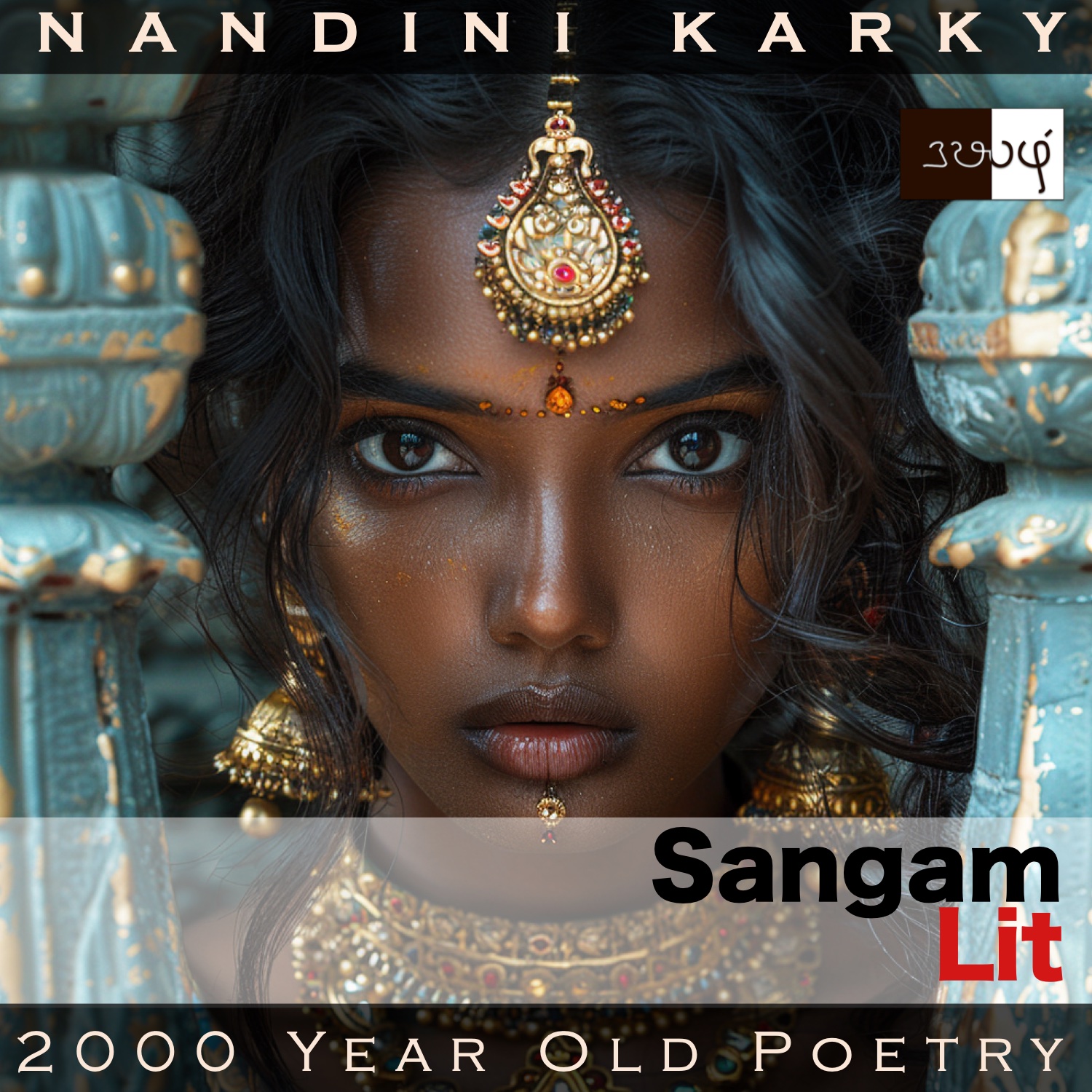Podcast: Play in new window | Download
Subscribe: Apple Podcasts | Spotify | Amazon Music | Android | iHeartRadio | Email | TuneIn | RSS | More
In this episode, we meet with a young maiden and her family, as portrayed in Sangam Literary work, Puranaanooru 337, penned by the poet Kabilar. Set in the category of ‘Kaanji Thinai’ or ‘Defence’, the verse brings to light a precarious situation involving suitors in marriage.

ஆர்கலி யினனே, சோணாட்டு அண்ணல்;
கவி கை மண் ஆள் செல்வர் ஆயினும்,
வாள் வலத்து ஒழியப் பாடிச் சென்றாஅர்,
வரல்தோறு அகம் மலர,
ஈதல் ஆனா விலங்கு தொடித் தடக் கைப்
பாரி பறம்பின் பனிச் சுனை போல,
காண்டற்கு அரியள் ஆகி, மாண்ட
பெண்மை நிறைந்த பொலிவொடு, மண்ணிய
துகில் விரி கடுப்ப நுடங்கி, தண்ணென
அகில் ஆர் நறும் புகை ஐது சென்று அடங்கிய
கபில நெடு நகர்க் கமழும் நாற்றமொடு,
மனைச் செறிந்தனளே, வாணுதல்; இனியே,
அற்றன்றுஆகலின், தெற்றெனப் போற்றி,
காய் நெல் கவளம் தீற்றி, காவுதொறும்
கடுங்கண் யானை காப்பனர் அன்றி,
வருதல் ஆனார் வேந்தர்; தன்னையர்
பொரு சமம் கடந்த உரு கெழு நெடு வேல்
குருதி பற்றிய வெருவரு தலையர்;
மற்று இவர் மறனும் இற்றால்; தெற்றென
யார் ஆகுவர்கொல் தாமே நேரிழை
உருத்த பல சுணங்கு அணிந்த
மருப்பு இள வன முலை ஞெமுக்குவோரே?
A long song revealing the verbal prowess of this prolific poet, known for his great friendship with King Paari. The poet’s words can be translated as follows:
“Uproarious is the respected leader of the Chozha country; Even if the hands that are raised in supplication before him belong to wealthy rulers, who have arrived bereft of their swords, singing praises, as they enter, with his heart in full blossom, King Paari would shower ceaselessly with his huge hands radiant with armlets. Akin to the cool springs in this Paari’s mountain country, she is someone rare to be seen. She shines with the glow endowed by the honour of femininity, trembling like a washed cloth that has been spread out to dry. Akin to the exquisite whiff of ‘Akil’ smoke, whose fragrance has journeyed delicately and hid inside a golden black mansion, the lady with a radiant forehead too abides under guard in her home;
Since she is of this nature, praising and desiring her, great kings keep arriving ceaselessly with those who guard their harsh-eyed elephants, feeding the beasts rice balls made from lush paddy in the adjoining forests. As for her brothers, they are known for their hot heads and blood-stained, tall spears that have crossed fierce battlefields. If such is their renowned strength, who would be left to embrace this pallor-spotted, ornament-clad maiden’s young and beautiful breasts, uplifted like elephant tusks!”
Let’s delve into the details presented here. The poet starts with a single-line character sketch of a king of a minor region in the Chozha territory, saying that this king is known for his loud and bombastic nature. Perhaps, he is quick to anger and evokes terror in those who want to approach him. After this one-liner, leaving this king aside, the poet goes on to talk about his friend, the great king Paari, who is known for his ceaseless generosity even to enemy kings with great wealth, if they happen to appear before him without their swords, simply singing praises in the manner of bards. When we are wondering why the poet has suddenly started talking about a different king, he clarifies that he has mentioned King Paari’s name only to talk about the cool springs in his mountain country. Just the way these are rare and precious, so is this maiden, the daughter of the king we met in the first line, the poet connects. He further equates this young maiden to the ‘agarwood smoke’ that steals inside a tall, tawny mansion and hides there, to talk about how she has been placed under guard in her home. This line teleports us to the ‘Aham’ poems, where we have read about young maiden being held inside homes when they reach a marriageable age.
Returning to this verse, we see the poet now turning his attention to the consequence of these events, which happens to be the endless arrival of kings seeking this girl’s hand in marriage, and not hearing a favourable response from the hot-headed father, they come with their battle-elephants and rations of rice balls, pitching their tents in the protected forests around. The poet takes another moment to now throw the spotlight on the girl’s brothers, who seem to have inherited their father’s temper and are known to be terrifying in the battlefield with their red-stained spears and threatening appearances. Now, the poet concludes with a sigh wondering who would have the strength to win and embrace that young maiden, given this situation!
In some ways, this poem is a continuation from the previous verse, talking about the fierceness of a girl’s family in resisting the many suitors, who come seeking her hand, and the threat of war that looms in the air because of this refusal. A war to win a maiden – Thinking of that makes us shake our heads in disbelief! Something that should tell us that our descendants in the future will have the same reaction, reading about the events of today leading to strife and battle, no matter how these are justified now by those in conflict!




Share your thoughts...